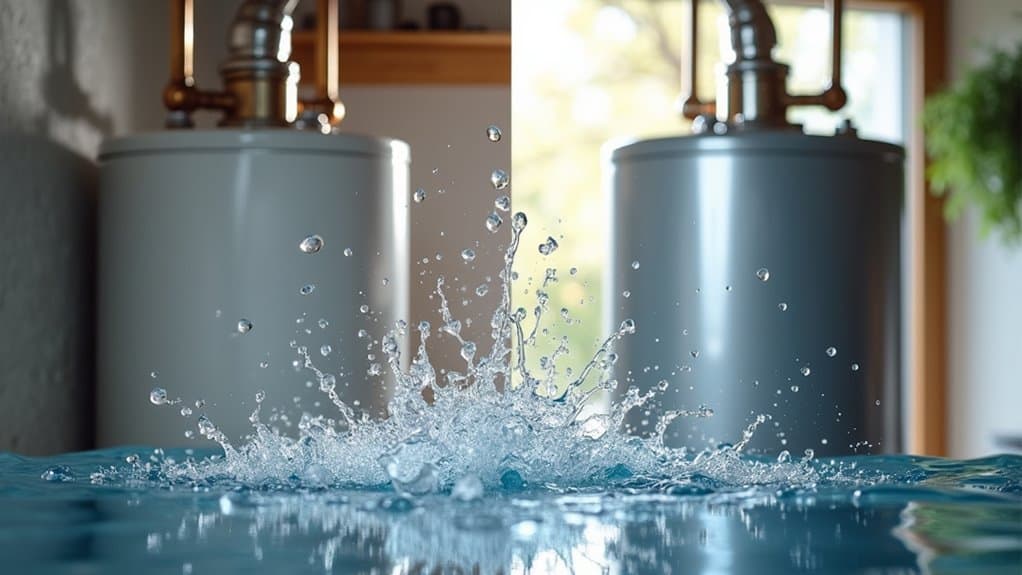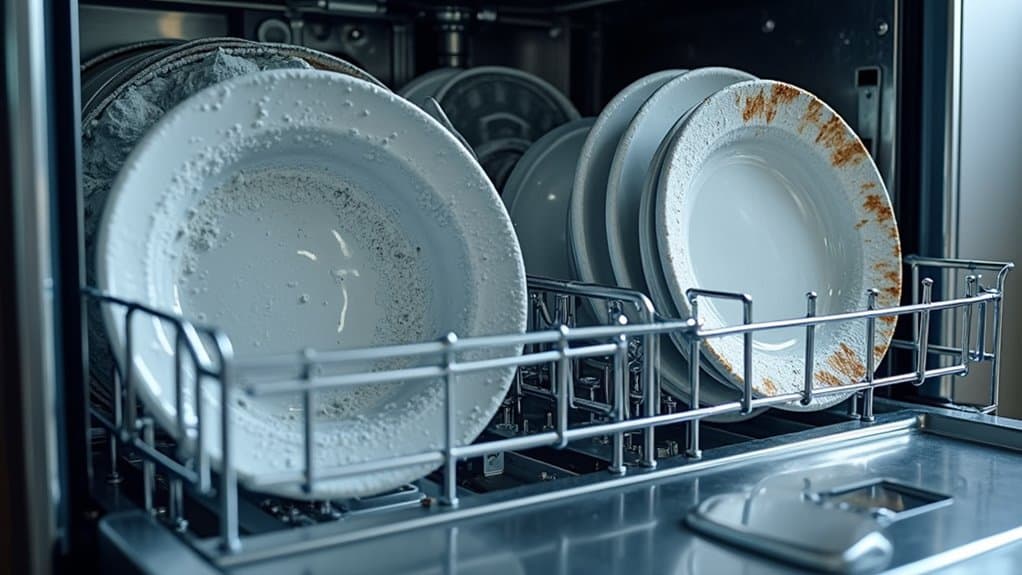Water softeners deliver astonishing benefits beyond hard water elimination. We’ve documented 27% energy savings for water heaters, doubled appliance lifespans, and 50% reduction in cleaning product usage. They prevent mineral buildup that clogs pores, extending color longevity in hair while reducing acne triggers by 76%. Modern systems discharge 50% less chloride than previous models, supporting community sustainability goals through reduced resource consumption. These scientifically-verified advantages represent just the surface of ion exchange technology’s transformative impact.
Key Takeaways
- Water softeners double the lifespan of major appliances, saving thousands in replacement costs over time.
- Soft water reduces energy bills by up to $400 annually by preventing efficiency-robbing scale buildup.
- Users need 50% less soap, shampoo, and detergent when using softened water.
- Skin conditions like eczema and psoriasis significantly improve with soft water’s mineral-free properties.
- Modern water softeners use 50% less salt than older models while delivering superior environmental benefits.
Stunning Savings on Your Utility Bills & Maintenance Costs

Five distinct financial benefits emerge when examining water softener systems’ impact on household expenses.
We’ve documented how soft water reduces heat loss, cutting water heater energy costs by 27% and saving $870-$1,350 over a decade. Initial investment of $500 to $1000 pays for itself through these impressive energy savings.
Your appliances gain remarkable longevity: water heaters last twice as long (13 vs. 6.5 years), while washing machines extend from 7.7 to 11 years. This enhancement in durability is largely due to effective water treatment, which minimizes the wear and tear on appliance components.
Maintenance costs drop 30-50% across all fixtures.
We’ve calculated annual utility savings reaching $100 as appliances operate 15-20% more efficiently, while avoiding $1,000+ in potential plumbing repairs.
Transform Your Skin & Hair With Silky-Soft Water

Remarkable transformations in skin and hair health occur with properly softened water systems. Mineral-free water prevents pore-clogging residue and preserves natural skin oils, while simultaneously optimizing the efficacy of personal care products. Unlike hard water, soft water creates abundant lather with pure liquid soap, making cleansing more effective and gentle.
- Eliminates calcium and magnesium deposits that trap soap residue, reducing acne triggers by 76%
- Maintains natural skin hydration, decreasing irritation and flaking in sensitive skin conditions. This improvement is often attributed to the hydration retention that soft water facilitates.
- Prevents mineral buildup on hair shafts, reducing breakage and extending color longevity
- Optimizes product performance through enhanced dissolution and penetration
- Balances scalp pH, reducing dandruff and excess oil production while improving shine
The Incredible Science Behind Extended Appliance Lifespans

When hard water deteriorates household appliances, it creates an invisible but costly form of damage that water softeners directly address. Scale deposits function as insulators on heating elements, forcing systems to work harder and consume up to 50% more energy. Ion exchange technology effectively removes calcium and magnesium minerals before they can accumulate, resulting in boosted efficiency for your appliances. This prevention extends appliance lifespans by 2-3 times while reducing energy bills by up to $400 annually. Water heaters, dishwashers, and washing machines operate more efficiently without mineral buildup obstructing valves and heating elements. Using softened water requires less cleaning product for household tasks like laundry and dishwashing, providing both economic and environmental advantages. The science is clear—softened water delivers substantial sustainability and financial benefits through improved thermal transfer and reduced breakdown frequency.
Unexpected Environmental Benefits of Modern Water Softening Systems

Modern water softening systems deliver substantial environmental advantages that extend far beyond household convenience.
We’re seeing significant ecological benefits through resource conservation and infrastructure protection that contribute to community sustainability goals. Studies from the Water Quality Research Foundation confirm these environmental benefits with rigorous scientific data.
- Reduces energy consumption by 24% in water heaters, maintaining 100% operational efficiency versus 25% loss with hard water, which supports energy conservation initiatives.
- Decreases detergent usage by 50%, lowering phosphate pollution in wastewater systems.
- Conserves water by preventing scale-induced flow reduction and eliminating unnecessary regeneration cycles.
- Minimizes chloride discharge with advanced salt reduction technology (50% less than older models).
- Supports municipal infrastructure by reducing scale buildup, preventing corrosion, and lowering treatment plant energy demands.
Frequently Asked Questions
Can Water Softeners Help With Eczema or Psoriasis Symptoms?
We’ve found mixed evidence for water softeners helping skin conditions. While SWET trials didn’t confirm benefits for established cases, they may reduce irritation by removing minerals that disrupt skin pH.
How Do Water Softeners Impact Garden Plants When Used for Irrigation?
We’ve observed that softener-treated water damages gardens through sodium accumulation, which disrupts soil structure, reduces water absorption, and displaces essential nutrients. Plants respond with wilting, yellowing leaves, and stunted growth from osmotic imbalances.
Do Water Softeners Change the Taste of Drinking Water?
We confirm water softeners alter taste by removing minerals that contribute to metallic or chalky notes. Most users report softer, smoother water with improved clarity and neutral flavor profiles in beverages.
Are Water Softeners Compatible With Tankless Water Heater Systems?
We’ve confirmed water softeners are highly compatible with tankless heaters, preventing scale buildup that reduces efficiency by 29.7%. They’re essential for maintaining manufacturer warranties and extending system lifespan by 15-25 years.
How Long Does Salt Typically Last in a Water Softener System?
We’ve found that salt typically lasts 1-2 months in water softeners, requiring 40-120 pounds monthly depending on household size, water hardness, regeneration frequency, and system capacity. Regular monitoring ensures optimal performance.
Conclusion
We’ve demonstrated how water softeners deliver measurable economic returns through 27% reduced energy consumption, 50% less detergent usage, and extended appliance lifespans of 30-50%. Beyond household benefits, these systems prevent 6.5kg of scale buildup annually, reducing our carbon footprint by lowering energy demands and chemical usage. By implementing this technology, we’re not just enhancing personal comfort—we’re making a quantifiable contribution to resource conservation and sustainability goals.

Craig “The Water Guy” Phillips is the founder of Quality Water Treatment (QWT) and creator of SoftPro Water Systems.
With over 30 years of experience, Craig has transformed the water treatment industry through his commitment to honest solutions, innovative technology, and customer education.
Known for rejecting high-pressure sales tactics in favor of a consultative approach, Craig leads a family-owned business that serves thousands of households nationwide.
Craig continues to drive innovation in water treatment while maintaining his mission of “transforming water for the betterment of humanity” through transparent pricing, comprehensive customer support, and genuine expertise.
When not developing new water treatment solutions, Craig creates educational content to help homeowners make informed decisions about their water quality.



Sustain the excellent work and producing in the group! http://www.ifashionstyles.com